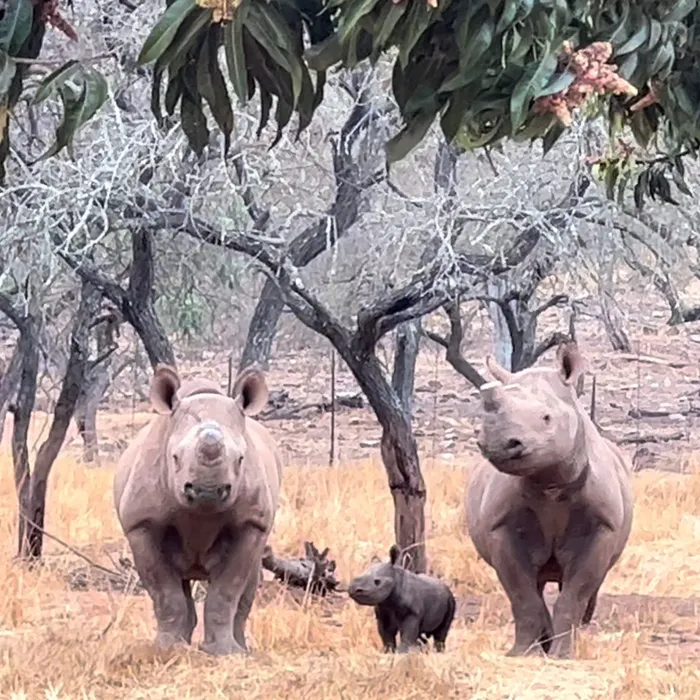WATCH: Examination and X-rays for critically endangered black rhino calf born at the Care for Wild Rhino Sanctuary

The first critically endangered black rhino calf was born at the Care for Wild Rhino Sanctuary to two orphaned poaching survivors, Phoebe and Ratu. | Care for Wild Rhino Sanctuary
Durban – The first critically endangered black rhino calf born at the Care for Wild Rhino Sanctuary to two orphaned poaching survivors, Phoebe and Ratu, was reunited with his mother after being taken into a treatment centre for examination and X-rays.
The calf was unable to bear weight on his foot.
Rescued and rehabilitated rhino orphan Phoebe gave birth to her first calf at Care for Wild.
While this marks the 19th calf born at Care for Wild, it is the very first black rhino calf born to two rehabilitated orphans of poaching.
On Saturday, Care for Wild said that as Phoebe’s calf was unable to bear weight on his foot this morning (Saturday), Care for Wild founder and chief executive Petronel Nieuwoudt called in veterinarian Dr Chris Smith.
“After thorough discussions, a strategic plan was made to bring the calf to our treatment centre for examination and X-rays, and then return him to his mom. He needs to be with his mom and we will do absolutely everything we can to keep him with Phoebe,” Care for Wild said.
The sanctuary explained that working with black rhinos is a high-risk operation that requires intense planning and a highly trained team. Nieuwoudt, Dr Smith and the most experienced Care for Wild team members used a vehicle to get close to the calf, sedate him and bring him to their main facility.
His breathing and heart rate were carefully monitored all the time.
“He weighs just 35kg, what an unbelievably precious little life,” Care for Wild said.
“Good news, the X-rays revealed no breaks or fractures. It’s possible that he could have stepped on a thorn that has since dropped out. Many of the thorn bushes black rhinos love to eat contain toxins that can cause irritation and pain if stepped on, especially for a calf whose feet are still very soft. He has been given medication to help with potential infection and discomfort. Petronel (Niewoudt) also used the latest in medical laser technology to assist with infection control, blood flow, and pain management.
“Being able to return him to his mom was a new and wonderful feeling! Petronel rubbed Phoebe’s defecation on the calf’s body before placing him back in the bush.
“Within minutes of waking up and calling, Phoebe, Ratu and Taro all came running to collect him, and he immediately began to suckle. We are all extremely relieved and grateful to see him back with his mom.”
Before the weekend, the sanctuary said that, as an orphan and a first-time mom, they were unsure how Phoebe would handle the transition to motherhood but she is coping beautifully and her calf is drinking well and regularly. She is an excellent mom and even dad Ratu is keeping a close eye on his son.
“We are a little concerned that he seems to have developed a limp. It’s difficult for rangers and caregivers to get close to see clearly, but at present he is still putting weight on his foot and is managing to keep up with his mom,” Care for Wild said.
“We have been in conversation with our veterinary team and, for now, our rangers will continue to observe closely through binoculars and thermal optics overnight. With first light, we will know more.”
Looking back at Phoebe and Ratu’s rescues, Care for Wild said Phoebe was rescued on September 21, 2017, after poachers killed her mother and sister in the Kruger National Park (KNP). At 18 months old, she was too young to survive on her own and was brought to Care for Wild for rehabilitation, care and protection.
Then in April 2018, another black rhino cow was found dead in the KNP. Signs of a calf were detected, but it took two days to locate him. The young calf was darted and flown by helicopter to Care for Wild, where he was introduced to Phoebe and named Ratu.
Phoebe and Ratu have since undergone extensive rehabilitation.
In 2021, a third black rhino orphan, Taro, joined them. Despite their species’ solitary nature, these three orphans have formed a strong bond.
“Now, with Phoebe having given birth to her first calf, all three rhinos are fiercely protective of the newest member of their crash,” Care for Wild said.
WhatsApp your views on this story at 071 485 7995.
Daily News
Orphaned black rhino introduced to caregiver with a magical way with calves
LOOK: Orphaned white rhino calf settling into her new life at sanctuary
WATCH: Rehab begins for orphaned white rhino calf flown to sanctuary after call from vet team in Kruger National Park